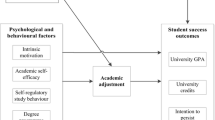Abstract
This paper estimates the effect of students’ background characteristics on the academic outcomes of their college roommates. It uses data from four classes of students at Wellesley College, where roommate assignment is credibly random, conditional on student responses to a housing preference form. In linear specifications, there are no peer effects on students’ grade point averages. There is some evidence that students’ SAT scores have nonlinear effect on their roommates’ achievement, but the results are not robust. We conclude that roommate peer effects might exist among small groups of students, but they are not a key determinant of students’ average academic outcomes at Wellesley College.
Similar content being viewed by others
References
D. Aaronson (1998) ArticleTitleUsing sibling data to estimate the impact of neighborhoods on children’s educational outcomes Journal of Human Resources 33 IssueID4 915–946
D. Epple R. E. Romano (1998) ArticleTitleCompetition between private and public schools, vouchers, and peer-group effects American Economic Review 88 IssueID1 33–62
W. N. Evans W. E. Oates R. M. Schwab (1992) ArticleTitleMeasuring peer group effects: A study of teenage behavior Journal of Political Economy 100 IssueID5 966–991 Occurrence Handle10.1086/261848
Foster, J. R. (2003). Peerless performers: The absence of robust peer effects at a large, heterogeneous university. Unpublished manuscript, University of Maryland.
A. Gaviria S. Raphael (2001) ArticleTitleSchool-based peer effects and juvenile behavior Review of Economics and Statistics 83 IssueID2 257–268 Occurrence Handle10.1162/00346530151143798
Gleason, M. A., and Siegfried, J. J. (2003). Academic roommate peer effects. Unpublished manuscript, Vanderbilt University.
Hoxby, C. (2000). Peer effects in the classroom: Learning from gender and race variation, Working Paper 7867. National Bureau of Economic Research, Cambridge, MA.
Kremer, M., and Levy, D. M. (2003). Peer effects and alcohol use among college students, Working Paper 9876. National Bureau of Economic Research, Cambridge, MA.
P. J. McEwan (2003) ArticleTitlePeer effects on student achievement: Evidence from Chile Economics of Education Review 22 IssueID2 131–141 Occurrence Handle10.1016/S0272-7757(02)00005-5
R. A. Moffit (2001) Policy interventions, low level equilibria, and social interactions S. N. Durlauf H. Peyton Young (Eds) Social Dynamics MIT Press Cambridge, MA 45–82
T. J. Nechyba (2000) ArticleTitleMobility, targeting, and private school vouchers American Economic Review 90 IssueID1 130–146
T. M. Newcomb (1966) The general nature of peer group influence T. M. Newcomb E. K. Wilson (Eds) College Peer Groups Aldine Chicago 2–16
E. T. Pascarella P. T. Terenzini (2005) How College Affects Students NumberInSeriesVol. 2 Jossey-Bass San Francisco
K. A. Renn K. D. Arnold (2003) ArticleTitleReconceptualizing research on college student peer culture Journal of Higher Education 74 IssueID3 261–291
S. G. Rivkin (2001) ArticleTitleTiebout sorting, aggregation and the estimation of peer group effects Economics of Education Review 20 IssueID3 201–209 Occurrence Handle10.1016/S0272-7757(00)00032-7
D. Robertson J. Symons (2003) ArticleTitleDo peer groups matter? Peer group versus schooling effects on academic attainment Economica 70 IssueID277 31–53 Occurrence Handle10.1111/1468-0335.t01-1-00270
B. Sacerdote (2001) ArticleTitlePeer effects with random assignment: Results for Dartmouth roommates Quarterly Journal of Economics 116 IssueID2 681–704 Occurrence Handle10.1162/00335530151144131
Stinebrickner, T. R., and Stinkebrickner, R. (n.d.). Peer effects among student from disadvantaged backgrounds. Unpublished manuscript.
E. J. Whitt M. Edison E. T. Pascarella A. Nora P. T. Terenzini (1999) ArticleTitleInteraction with peers and objective and self-reported cognitive outcomes across three years of college Journal of College Student Development 40 IssueID1 61–78
G. C. Winston D. J. Zimmerman (2004) Peer effects in higher education C. Hoxby (Eds) College Choices: The Economics of Where to Go, When to Go, and How to Pay for it University of Chicago Press Chicago
D. J. Zimmerman (2003) ArticleTitlePeer effects in academic outcomes: Evidence from a natural experiment Review of Economics and Statistics 85 IssueID1 9–23 Occurrence Handle10.1162/003465303762687677
Author information
Authors and Affiliations
Corresponding author
Rights and permissions
About this article
Cite this article
McEwan, P.J., Soderberg, K.A. Roommate Effects on Grades: Evidence from First-Year Housing Assignments. Res High Educ 47, 347–370 (2006). https://doi.org/10.1007/s11162-005-9392-2
Received:
Issue Date:
DOI: https://doi.org/10.1007/s11162-005-9392-2




